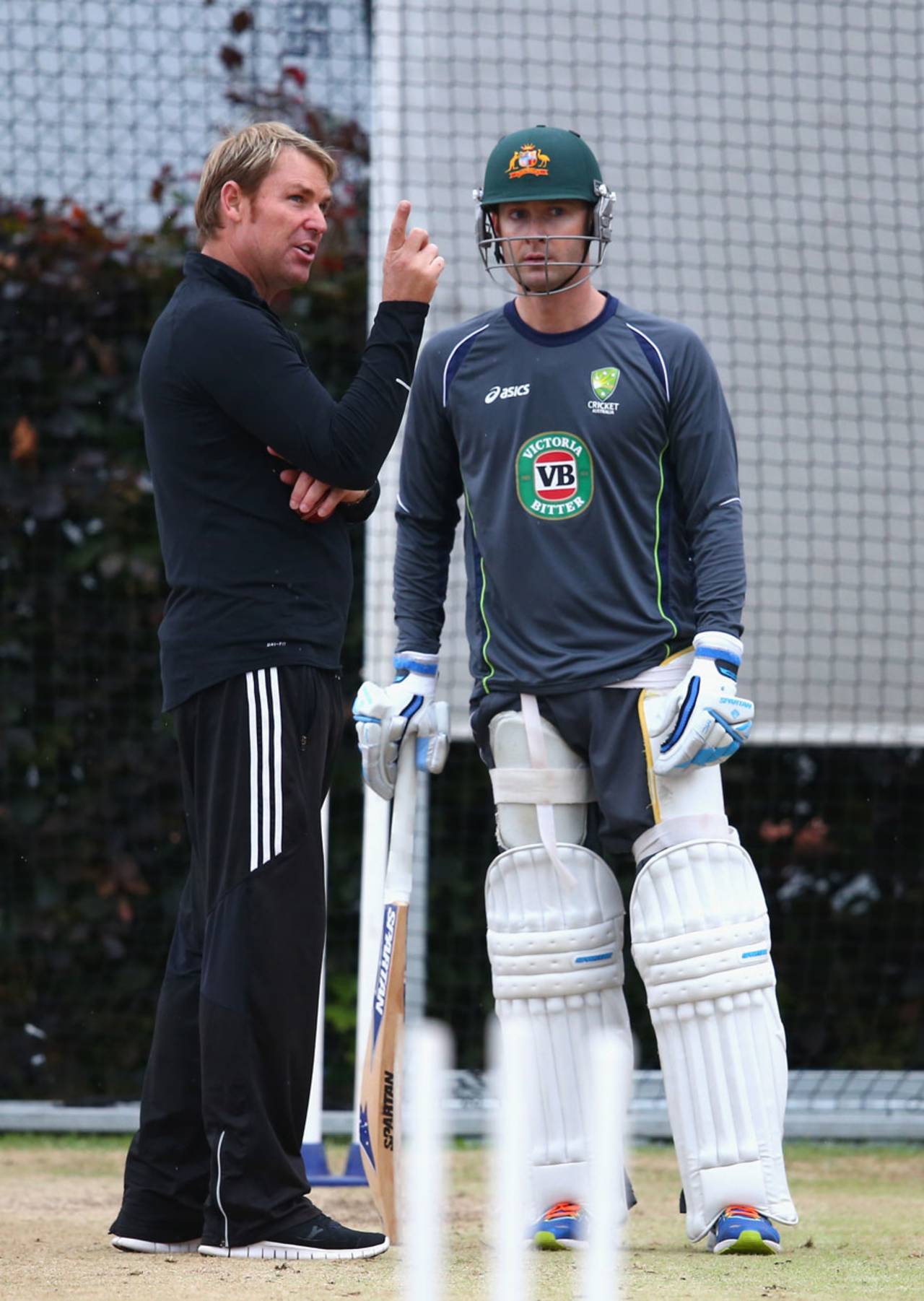Warne's still scrapping
He has never believed that a cause is lost, and he brings something of the same fervour to his commentary and writing
Jon Hotten
Aug 27, 2013, 3:57 PM

Warne: still going to war for Australia alongside good mate Michael Clarke • Getty Images
Only time could rob Shane Keith Warne of his genius with a cricket ball in hand, and not even time can quell his desire to compete. He remains Australia's arch-provocateur.
As Gideon Haigh has illuminated, Warne shimmers through Australian cricket and Australian culture. His hold on batsmen was both physical and psychological. He was the player of games, one of those people who somehow understood which buttons to push and when. To encounter him on the pitch was to engage with not just a bowler but a persona.
The bowler has gone but the persona lives. Through his column for the Telegraph newspaper and his perch in the Sky Sports commentary box, he has engaged with England from as close as he can get.
Warne has never believed that a cause is lost. He was at his best as a player and as a man in 2005; a leviathan in defeat and with his spirit and his skill undefeated.
This summer, nine years on and with so much changed (then: still the ageing rogue-about-town in the world's greatest team; now: slimmed-down, blue-toothed metrosexual, with England's Liz Hurley as his girlfriend), he has been caught in a cleft stick, smart enough to know which way the wind blows, yet still believing he can make it prevail in his direction.
Here are some sample headlines from his weekly column, which read retrospectively as a study in false hope with a swelling undertone of delusion: "We can surprise England", "Lehmann the right man", "One big score and the fightback is on", "Clarke is best captain in the world", "How to beat England", "Australia must take Anderson down", "England were lucky", "England have been too arrogant", "England won despite Cook's caution", "Fear factor gone, so bring on the fight Down Under".
In the commentary box, he was often undressing the game more quickly than the players. Warne has never seen a batsman whose technique he can't unpick, and he probes at a point in the same way, altering his angles, rephrasing his questions. As the lone Australian voice, he was fighting a corner too, and he prickled occasionally at the triumphalism around him.
Much of this is surface, the part that Warne wants the public to see and hear. The message is almost always sunny, and where it can't be sunny it is at least forward-looking. It's the public manifestation of that unyielding, unending belief that any game can be won. He has never hidden his close friendship with Michael Clarke, nor his close links with the dressing room. He was a presence there too, often speaking to Clarke out on the field before the start of play.
In that context, his message can be seen as travelling two ways, not just outwards to the public but inwards to the Australians. His headlines and commentary are exhortations, rallying cries. Perhaps this is their truest meaning.
When Warne was losing on the pitch, he was at his most indomitable - along with 2005, the shocking reversal of fortune in Adelaide in the return series was a living example of what can be achieved with force of will. The effects of his time at Hampshire and in Rajasthan are still being felt, so deeply did his beliefs and methods imbue themselves there. Along with being one of the cricketers of the century, he has been one of the great shapers of a collective mindset. That's what he is trying to do in the media too.
In sport, battles are lost but the war is unending. After the unofficial watering of the Oval square by England, Warne once again sought the smallest advantage:
"To go and disrespect something as ancient as the Oval pitch in such an unnecessary and crass way is a pretty ordinary and arrogant thing to do, I wonder also if the opposition was mentioned too?"
"They've beaten you and now they're trying to piss on you…"
This was his message for the return. In using it, perhaps he has illustrated best of all how little Australia have left to cling to.